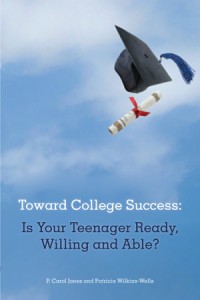Today’s guest post is written by Carol Jones, author of Toward College Success: Is Your Teenager Ready, Willing, and Able? Carol approaches the college preparation process from more than an academic viewpoint. She recognizes that students need to be taught to be independent adults before heading off to college.
*****
 By now, most parents and their students are settled back into the routine of school. Back-to-school night is over and students have their schedules down. Now that the chaos has smoothed a bit, consider this: Nearly 27 percent of college freshmen flunk out, drop out, or disappear mysteriously from their university and college campuses. When your son or daughter waves goodbye from the dorm parking lot, what’s the chance that he or she is going to add to that statistic?
By now, most parents and their students are settled back into the routine of school. Back-to-school night is over and students have their schedules down. Now that the chaos has smoothed a bit, consider this: Nearly 27 percent of college freshmen flunk out, drop out, or disappear mysteriously from their university and college campuses. When your son or daughter waves goodbye from the dorm parking lot, what’s the chance that he or she is going to add to that statistic?
Whether you have a high school senior, a freshman, or even a middle schooler, parents who expect their child to go on to higher education need to prepare those students while they are still living at home. If parents really want their students to successfully maneuver all the temptations of parties, late nights, and skipping classes while culling a college education, a degree, and the beginning of a promising career, they need to start preparing their teenagers long before the end of high school.
And I am not talking just about academics. Academics is, of course, an crucial part, but if your teenager cannot wake himself up in the morning, cannot handle conflict, cannot manage her time and priorities, cannot self-advocate, cannot manage his money, does not know when she needs help or how to get it, then despite a stellar grade point average, that teenager will be leaving home with a deficit.
In my book, Toward College Success: Is Your Teenager, Ready, Willing, and Able?, I show parents that developing the skills for a successful college experience needs to begin long before you wave goodbye at the dorm parking lot. Most of the skills I am talking about are covered in basic parenting, but many of us in an attempt to instruct, guide, and model, end up interfering and rescuing—which, of course, only teaches them that mom and dad will take care of everything.
Teenagers need graduated responsibilities with real consequences. Many will stumble, but when they do make progress, they should be rewarded with more responsibility. For example: extend curfew hours, allow more driving privileges, let them take on a part-time job, even let older teens attend events without adult supervision. Praise them when they show responsible behavior and be ready to go back a step when they don’t.
Let your teenager make his own appointments to talk with a teacher or to make the orthodontist appointment. Guide him to figure out his time and calendar and commitments—you will not be there to do it for him in college. College is a time of much change, more freedom, and new and challenging situations. Students who come already capable of figuring out how to solve a conflict with a roommate, how to safely handle themselves at a party, how to determine just how much time they need to study for that mid-term, are the students more likely to succeed in their academics. Look for the opportunities to give your middle and high school students a chance to mature, to be responsible, to learn from failures and consequences, and to accept challenges. By doing so, you are guiding them toward college success.
******
To learn more about Toward College Success: Is Your Teenager Ready, Willing, and Able?, go to http://www.pcaroljones.com/ to read excerpts, buy the book, follow Carol on Facebook, or to read her blog.

![8115_imagination_challenge_150x260_en[1]](http://www.parentingforcollege.com/wp-content/uploads/2011/08/8115_imagination_challenge_150x260_en1.jpg)








